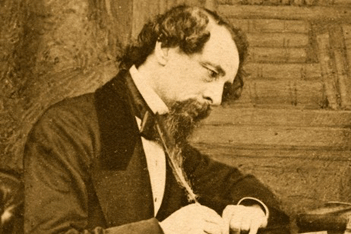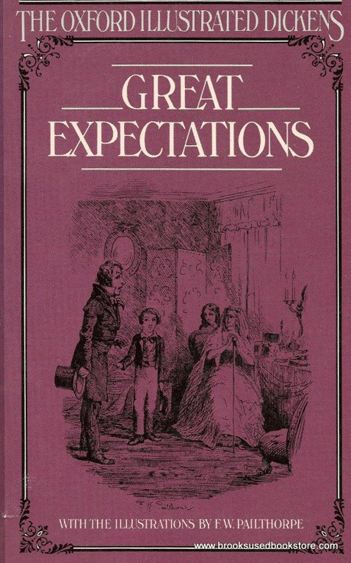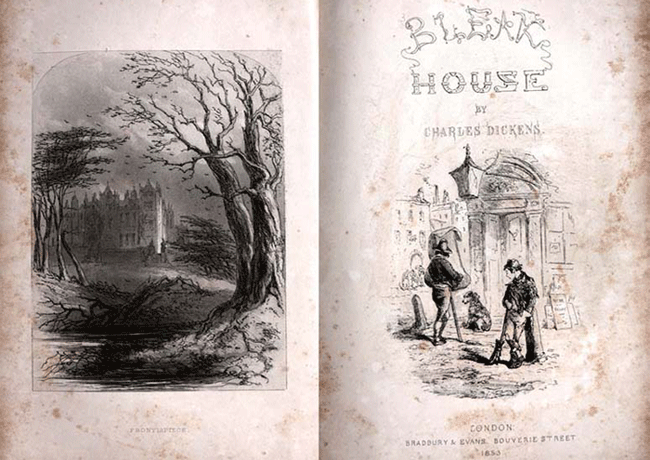Charles Dickens: A love story
Before there was Serial, there was Charles Dickens. Offering weekly or monthly morsels of fiction, Dickens was an international literary sensation. If he were around today, he’d be writing for television and he’d be a superstar. One paragraph in and I’ve already hit a superlative high. I haven’t even started.

This is not going to be the usual Dickens article, starting with his impoverished childhood, talking about his intense work ethic, how he wrote 2000 words every day before breakfast, moving on to his family and the immense number of children he had, and rounding out with his commitment to social justice. This is not that article. If you want that stuff, go read the Wikipedia page. This is a straight up love letter.
[pullquote]I was smitten. I adored Pip. He was so flawed and yet so likeable. He made bad decisions but he was a good guy.[/pullquote] My first Dickens book was a hardback cover of Oliver Twist, given to me by my aunt when I was 8 years old. I dutifully kept it in the lav, thinking that that would somehow help me to read it. It didn’t. I found it just too damn hard. And for many years it languished in the lav, gathering dust and I-don’t-want-to-think-what-else. Fast forward to high school where I read Great Expectations for the first and certainly not for the last time. I was smitten. I adored Pip. He was so flawed and yet so likeable. He made bad decisions but he was a good guy. Sometimes he was a jerk and sometimes he got jerked around. The whole book is just this technicolour pastiche of wonderful. I’ve since gone on to read all of Dickens’ work, including that grubby copy of Oliver Twist.
Dickens is funny. Dickens is absurd. Dickens is sentimental. And above all else, Dickens is entertaining. He knew how to weave many tales together in order to tell a complete story. And he was a genius at creating incredible characters. Everyone knows Oliver Twist and David Copperfield, Miss Havisham and Lady Dedlock, as well as a whole host of memorable minor characters such as Fagin, Magwitch and Uriah Heep. Some of his characters have passed into our general lexicon, like Scrooge. Others have become symbols in their own right, separate entities. Miss Havisham, for example, is a synecdoche for wasted youth and unhealthy malice.
There are children in rags starving in hovels, armies of lawyers in plain black suits, miserable apprentices, women of impossible purity and high moral standards, beggars with hearts of gold, misers with hearts of stone, heaps of dust, rivers of murder, true love, true friendship and unrestrained hatred. So much for those stuffy Victorians.

Dickens’ characters are often accused of being stereotypes or archetypes. And it’s true that at first glance, the baddies are bad, the goodies are good, the crazies are crazy and the weirdos are weird. But most of his characters (I won’t say all; there are plenty of stereotypes in his works) are more nuanced than they at first seem. I would suggest that any character we meet, in real life or on the page, stands out to us by their curiosities. You rarely meet someone and say, ‘who was that nice chap we met last night? The one who was wholly unremarkable?’ Normally you remember something weird or annoying or lovely about them. Only later do you start to add light and shade. My own favourite character is Wemmick, the legal clerk in Great Expectations, whose mouth is like a post-office box. When he eats biscuits, he tosses them into the slit, “as if he were posting them”. But this dry middle-aged man, who is not in the habit of trusting anyone, and who worries constantly about portable property, has a tender side. He lives with his ancient father in a tiny house which he has done up as a castle, complete with a moat, battlements and even a cannon. One day I wish to live in Wemmick’s house.
[pullquote]You could never accuse Chuck of being subtle. His broad brush strokes show us thick fog and muddy streets. His London is a desperate place, and dirty.[/pullquote] Our modern perceptions of Victorian London are very much coloured by what Dickens wrote. You could never accuse Chuck of being subtle. His broad brush strokes show us thick fog and muddy streets. His London is a desperate place, and dirty. “Fog everywhere. Fog up the river, where it flows among green aits and meadows; fog down the river, where it rolls defiled among the tiers of shipping and the waterside pollutions of a great (and dirty) city” (Bleak House). This is a London – and greater England – at the beginning of the industrial revolution. Everything is changing and nothing is certain. And Dickens gives it to us with so much love, humour, pathos, and unrestraint that I love him for it.

Dickens has also left us with some of the most famous lines in literature. “It was the best of times, it was the worst of times” are the opening words of A Tale of Two Cities. The last line of the same book is equally famous: “It is a far, far better thing that I do, than I have ever done; it is a far, far better rest that I go to than I have ever known.” However, modern readers might find some of Dickens’ prose impenetrable. He’s definitely wordy, and each book is a sizeable tome. But they are designed to be enjoyed in small chunks. They were originally published in magazines, either monthly or weekly. As for the prose, sometimes the payoff for a joke comes in waiting patiently til the end. In Our Mutual Friend, which I chortled my way through recently – I may have even slapped my thigh occasionally – a young man aptly named Sloppy is described primarily through his buttons.
“Of an ungainly make was Sloppy. Too much of him longwise, too little of him broadwise, and too many sharp angles of him angle-wise. One of those shambling male human creatures, born to be indiscreetly candid in the revelation of buttons; every button he had about him glaring at the public to a quite preternatural extent.” (Our Mutual Friend)
For many years, if you’d asked me what my favourite book was, I would have said Great Expectations without hesitation. (I don’t answer the question anymore, because there are too many books to love!) I wasn’t ever really sure why it was my favourite. Is it exceptionally well written? It’s okay. Is the story fascinating? It’s all right. I think, overall, it’s just deeply satisfying. And that’s how I feel about all of Chuck’s works. Good stories, well told, with lots and lots of superfluous guff just to keep it interesting. Sure he’s a bit sentimental, the stories are riddled with impossible coincidences, many characters are over the top and he pushes the moral agenda pretty hard sometimes. But in spite all of this, as you can no doubt tell, I love him to pieces. And I always will.
What about you? Tell us in the comments whether you hate him or love him!

